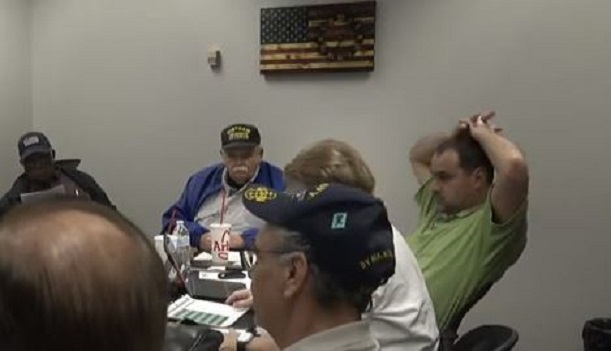Madison County, Ill. – Veterans Assistance Commission (ECWd) –
This article is Part 2 of our concerns that the public body of the Veterans Assistance Commission of Madison County is being “blended” or comingled with a nonexistent nonprofit (searches of the IRS Charity Database yield no results) of the same name and used to perpetuate the false notion that an employee of the public body can chair a meeting of the public body while prohibiting actual members of the public body from chairing their own meetings.
Continuing from Part 1:
Dillon’s Rule (not Home Rule) applies to this and all VACs. The VAC and its employees possess only those powers granted to it by the legislature and those powers necessary and indispensable to accomplishing the powers granted. In other words, one must look to see if a power is granted, not look for a restriction of the powers. If the statute is silent, the non-home-rule public body does not possess the power and all questions raised are to be resolved in favor of the lack of power.
From the Opinion (below):
PARAGRAPH – 3
“Until now, it has been the practice of the VACMC to permit the President of the Board of Directors to chair the membership meetings. However, Public Act 102-1132 gutted that Board of any decision-making authority while maintaining the Superintendent’s executive authority over the VAC’s operations. The bylaws do not define the President’s duties other than stating that the unexpired term of any officer/director vacancy is filled by him with Board approval (Art. V, §3). The 2017 bylaws state that proceedings at all business meetings shall be governed by Robert’s Rules of Order (Art. VII §3), but also state that as the statutes change, so changes the bylaws (Art. XIII §2). There is nothing in Robert’s Rules of Order (RRO) that mitigate against the Executive of an organization chairing the meetings.”
First and foremost, the VACMC (as a public body) has never “permitted” the President of the “full commission” to chair its meetings (it is inherent in his role as the president of the full commission), but since this paragraph talks about the president of the “board of directors” it must be addressing the nonprofit and not the public body.
Public Act 102-1132 never gutted any board of decision-making authority as they never possessed any decision-making authority to begin with – nothing in the previous version of the statute granted the Executive Board or any other committee of the full commission any powers. Yes, the Superintendent did maintain duties, but they are statutorily shared with or under the direction of the full commission.
Again, this reads like it is designed for the “nonprofit” meeting, not the public body meeting. There are no “Board of Directors” in the public body of the VACMC, and what this and other VACs (see Will County) have done with their alleged “executive boards” has always contradicted state law. The “Board of Directors” or “Executive Board” has never had any powers to make any decisions of any VAC (public body) in this state. The updated MVAA simply restates what should have been obvious to everyone.
Finally, the attorney includes a negative from Robert’s Rules of Order, however, Robert’s Rules of Order specifically defines a chairman’s role, which is to chair the meetings.
PARAGRAPH – 4
“As such chairperson, the superintendent’s role is not without limits. Section 50 of RRO [Robert’s Rules of Order] suggests that when there is a conflict of interest, the chairperson may call another to assume the chair in his/her stead while s/he addresses the membership on the conflicting matter. The new amendment permits 3 different VSOs to call for the removal of a Superintendent, and that a vote of the full membership is required to remove. Additionally, when whoever chairs the meeting makes a ruling on parliamentary procedure, it is subject to a motion to appeal. Furthermore, the new amendment prevents a Superintendent from also being a voting delegate representative of any VSO. Thus, although s/he may chair the meeting, s/he has no vote on any motion properly before the meeting and may not make a motion on his/her own.”
We agree with all of this paragraph except for the last sentence. The Superintendent has no role in chairing a meeting of the Full Commission or of any committee of the commission. The elected board officers possess that role and one officer cannot delegate his authority or duties to an employee. Section 50 of the RRO has nothing to do with the issue of this meeting.
PARAGRAPH – 5
“This opinion is given at the request of Ronnie Hicks, the current President of the Executive Board with his agreement that the Superintendent should chair membership meetings. I have not completed my analysis of the impact of all the changes made by the latest amendments to the MVM. But, for the purpose of conducting a valid meeting, it is my opinion that the Superintendent should chair the membership meetings of the VACMC.”
As previously stating, If the VAMC (public body) President Ronnie Hicks is not capable of chairing a meeting if the full commission, then the vice-chairman takes on that role. The President cannot “agree” that someone else should chair the meeting.
The Superintendent is not a member of the full commission, is not a delegate or alternate appointed to the commission and cannot chair meetings of the commission.
VAC_Opinion Letter_20230315








No Comments
Sorry, the comment form is closed at this time.